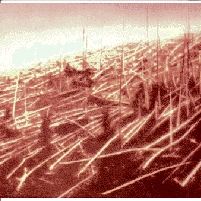How to Defend the Earth from Flying Objects
Tuesday, January 26, 2010
 Trees flattened by Tunguska fireball, photographed in1927
Trees flattened by Tunguska fireball, photographed in1927
In order to protect the earth from devastating collisions with objects from outer space, scientists must first know what’s out there—which may take longer than anticipated unless the federal government appropriates more money. This finding is one of many contained in a report by the National Research Council (Defending Planet Earth: Near-Earth Object Surveys and Hazard Mitigation Strategies) that spells out the challenge facing NASA as it works to locate all potentially dangerous near-earth objects (NEOs), which can range from the man-made, like satellites or space debris, to the space-based, like asteroids.
Congress had mandated that NASA discover 90% of all NEOs that are 140 meters in diameter or greater by 2020. But the space agency hasn’t been given sufficient funding to complete this task, according to the report. Researchers argue the government will have to spend more money to launch a space mission that will complement scanning by ground-based telescopes to complete the mapping mission by around 2020. Otherwise, the task may not be completed until at least 2030.
The report also notes that it might be prudent for NASA to look for smaller NEOs as well. Some scientists believe the Tunguska blast in Russia’s Siberia region in 1908, which wiped out 2,000 square miles of forest, may have been caused by a meteoroid only 30-50 meters in diameter.
-Noel Brinkerhoff
Defending Planet Earth: Near-Earth Object Surveys and Hazard Mitigation Strategies: Final Report (National Research Council)
- Top Stories
- Unusual News
- Where is the Money Going?
- Controversies
- U.S. and the World
- Appointments and Resignations
- Latest News
- Trump to Stop Deportations If…
- Trump Denounces World Series
- What If China Invaded the United States?
- Donald Trump Has a Mental Health Problem and It Has a Name
- Trump Goes on Renaming Frenzy






Comments